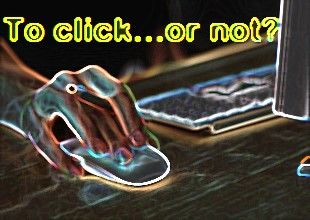Deception
Clickbait, Eye Candy, and the World Wide Web of Deception
If you respond to clickbait, are you the "catch"?
Posted February 28, 2020

Is it possible that we’re seeing more online advertising than ever? No, you’re not imagining this… According to the Interactive Advertising Bureau, businesses spent about $10 billion per month in online advertising last year, a 17 percent increase over the prior year (IAB, 2019).
Browsing online, we are exposed to thousands of ad boxes, banners, side panels, and pop-ups every day. While we see lots of ads, how often do we actually take the bait and click on these ads?
We call it “clickbait” for a reason—ad content whose main purpose is to attract attention and encourage users to click a link leading to a target web page. Advertisers try to capture your interest with everything from sexy models, to puppies and kittens, to outlandish claims that tease your curiosity. Clickbait promises us something: a secret glimpse, special products or information, ways to be healthier, richer, cooler, or less bored. If we respond, are we the “catch”?
One study used eye-tracking technology to study web browsing. Subjects navigated social media sites, visiting on average 411 pages and viewing 1,746 ads. The researchers tracked how often and long users looked at page content versus advertising.
Users averaged 6.58 percent of their time looking at ads… that’s about 40 seconds viewing ads for every 10-minutes online. Another result was that participants looked at simpler ads more than complex ones, in that they viewed text ads at twice the rate they viewed ads with images and video. It may take more time to read ads than view images, and these data are from just one study—so take the results with a grain (or two) of salt. Still, these findings confirm what many of us have been saying for a long time: “Keep it simple!”
For some, it’s about the news, and for others, it’s about food. Do you crave technology, fashion, cute baby animals, or health products and information? Whatever your appetite—we often succumb to the temptation of clickbait.
There are ways to block the “pop-ups” from invading your screen. But most ads surround and are intertwined with the content we’re reading. It feels like we skip over this visual spam—but do we? One finding in the previously mentioned study of web behavior was that even when users don’t click on ads, they still registered information from the ads. Though we skip past ads and possibly do not consciously perceive them, ads may still plant subliminal seeds in our minds!
For me, a random online journey is my lunchtime escape from work. It allows me to take a break and to go online without a plan, map, or purpose. Sometimes, I just like to click and browse. How else would I have learned about “3 foods we should never eat,” the amazing “Government photos of a UFO!” or perhaps I’d have missed “You won’t believe how (famous person) looks today”? Obviously, the psychology here is trying to trigger a rise out of us—to elicit such an emotional reaction that we cannot resist the urge to click and satisfy our curiosity.
Clickbait works best when it triggers an emotional response. Marketing people find sneaky ways to tweak our limbic systems to engage the psyche. It’s in our nature to click links when we are curious or aroused.
This doesn’t only work for advertising. Emotionally provoking news headlines also capture our attention. A headline has a much greater chance of receiving a click when a more extreme sentiment is expressed.(1)
I’ve written about “time management.” I should state the obvious: If you are busy working, then you probably should not waste time on clickbait. Yet not every random adventure on the Internet has to be risky.
When we do take that detour, we feed our curiosity. We look at photos, videos, places, people, stories, and more. This is mostly harmless web-surfing that many of us enjoy, be it news, travel, recipes, kittens, or psychology blogs.
This is the adventure—finding out the unexpected, enjoying surprises, or just discovering things that make you say: “Hmm.” It’s OK to set aside some time for an online scavenger hunt. Just don’t overdo it so this behavior eats into your productivity. Browsing links can take you to new places, people, and unexpected learning about our world. Enjoy!
References
(1) Reis, J., Benevenuto, F., Vaz de Melo, P.O.S., Prates, R., Kwak, H. & An, J. (2015). Breaking the News: First Impressions Matter on Online News. Cornell University open access archive - ICWSM: Computers and Society (cs.CY); Computation and Language (cs.CL): arXiv:1503.07921 [cs.CY]


